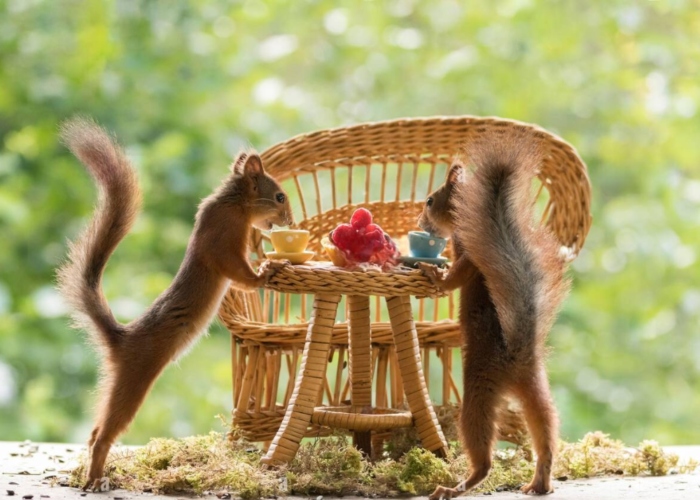Squirrels, with their curious and resourceful nature, are known to explore various objects in their surroundings, including your outdoor furniture. If you’re a wicker furniture owner and have noticed signs of damage, you might wonder: do squirrels eat wicker furniture? In this guide, we’ll delve into this question and explore the behaviors of squirrels around wicker furniture.
From understanding their habits to implementing preventive measures, we’ll unravel the mystery behind squirrel interactions with wicker furniture. By gaining insight into these furry creatures’ behavior, you’ll be better equipped to protect your outdoor decor and maintain its longevity.
Let’s uncover the truth about squirrels and wicker furniture, and learn how to coexist harmoniously with these backyard visitors.
Contents
1. Do squirrels eat wicker furniture?
Natural and plastic patio wicker furniture, with its woven structure, can attract squirrels for many reasons.
One of the main reasons squirrels gnaw on outdoor furniture is to sharpen their teeth. Squirrels have continuously growing incisors, so they need to keep their teeth short and sharp. Furniture made of wood, plastic, or metal can all be targets for squirrels to hone their teeth.
Additionally, squirrels destroy patio furnitures and cushions to gather materials for nest building, such as fibers, fabric, or padding. Squirrels often build nests high in trees or on rooftops to avoid predators and harsh weather, requiring them to have sufficient materials to insulate and protect their nests.

2. How to keep squirrels from eating wicker furniture?
Protecting wicker furniture from squirrel damage requires a combination of preventative measures and deterrent strategies. Here are some effective ways to keep squirrels from eating wicker furniture:
- Spray to keep squirrels from chewing your wicker furniture: Use Squirrel-Repellent sprays on the wicker furniture. These sprays typically contain natural ingredients with strong scents that deter squirrels.
- Use natural scents that squirrels hate: Squirrels have a strong aversion to certain scents, making them effective natural repellents. Peppermint oil, capsaicin, garlic, hot peppers, vinegar, onion, coffee grounds, cinnamon and predator urine are among the smells squirrels hate.

- Use predator scents: Utilize predator scents, such as fox or coyote urine, around the wicker furniture. Squirrels are naturally cautious and may avoid areas where they sense the presence of potential predators.
- Install physical barriers: Place physical barriers around the furniture, such as wire mesh or netting. This can prevent squirrels from accessing the furniture and discourage them from attempting to chew on it.
- Keep the area clean: Remove any food debris, fallen seeds, or other tempting items from around the wicker furniture. Keeping the area clean reduces the attractiveness of the furniture as a potential food source.
- Use squirrel-proofing devices: Employ squirrel-proofing devices, such as baffle guards or cone-shaped wraps, on the furniture legs. These barriers can make it difficult for squirrels to climb and reach the wicker.
By combining these methods, you can create an environment that discourages squirrels from eating wicker furniture and preserves the integrity of your outdoor furnishings.
3. FAQs
3.1 What do squirrels hate the most?
Squirrels tend to strongly dislike the scent of certain substances. Among the scents that squirrels commonly find unpleasant are those of predator urine, such as fox or coyote urine. Additionally, strong-smelling substances like garlic, vinegar, and certain commercial repellents can be effective in deterring squirrels.
However, it’s important to note that individual squirrels may react differently, and the effectiveness of repellents can vary.
3.2 Do pinwheels and fake owls scare away squirrels?
Pinwheels and fake owls are commonly used items to deter nuisance squirrels from damaging crops or household gardens. However, their effectiveness can vary depending on factors such as the type of squirrel, the environment, time, and placement.
According to some studies, pinwheels may reduce the presence of red squirrels in areas with strong winds but may not have an impact on black or gray squirrels. Fake owls can also intimidate squirrels, but only for a short period, as squirrels will eventually realize they are not actual predators.
Therefore, to enhance the effectiveness of pinwheels and fake owls, users should combine them with other measures such as installing fences, using natural or artificial squirrel repellents, or keeping a pet cat.
3.3 What is the best homemade squirrel repellent?
Some people believe that using spicy substances like chili, pepper, or ginger is an effective way to repel squirrels from their gardens. However, studies have indicated that squirrels can adapt to the spicy taste and may even consume these substances as a type of seasoning.
Therefore, a better approach is to use strongly aromatic plants such as mint, lavender, or chamomile. These plants not only emit unpleasant odors for squirrels but also contribute to the aesthetic appeal of your garden.
4. Conclusion
In conclusion, while squirrels may occasionally nibble on wicker furniture, they typically do not consume it as a primary food source. Instead, their interest in wicker furniture may stem from their natural curiosity, chewing behavior, or the need to gather materials for nesting.
By understanding these behaviors and implementing preventive measures such as placing deterrents or providing alternative materials for nesting, you can minimize the risk of damage to your wicker furniture.
For further questions, don’t hesitate to send thanhcongcraft an email us at [email protected] or message us at WhatsApp: +84967485411. Hope to serve you soon! Best regard!


